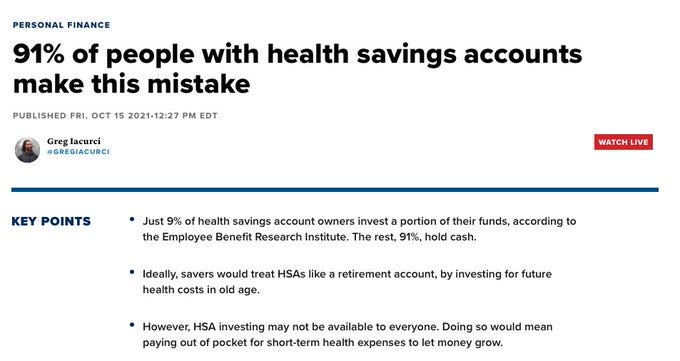Tax Advantaged Multiplied by 3.
Health Savings Accounts
This week I wanted to shine a little light on one of the most powerful tools to build wealth. The Health Savings Account, or HSA, is likely the most tax-efficient vehicle when it comes to investing. However, most will not take full advantage of this type of account.
One note: Everything discussed here is at the Federal level. There are a few states that do not conform to the Federal rules… (NJ, CA, NH, TN). Other than that, states usually follow the same Federal rules!
Here are the basics:
In order to be eligible for HSA contributions, an individual must be enrolled in a qualifying high-deductible health plan. In my experience, young professionals tend to opt for this type of plan given the low expectation of health related matters.
One other item: The individual must not be claimed as a dependent on someone else’s tax return.
For 2025, the self-coverage contribution limit is $4,300 and for family coverage, the maximum is $8,500. For anyone above 55, there is the ability to contribute an additional $1,000 per year.
Quick note: Employer contributions to an HSA WILL count towards the annual contribution limits.
How to contribute:
To an external HSA custodian: This would allow for a deduction come tax filing. Very similar to how a deductible contribution to an IRA would work.
Through an employer sponsored Section 125 Cafeteria Plan: This is usually the most advantageous way to contribute. Through a cafeteria plan, contributions can avoid FICA taxes, unlike contributions to an external HSA custodian.
Why contribute:
Contributions to an HSA are made on a pre-tax basis. Similar to a pre-tax 401(k)! There is an up-front tax benefit to contributing to these accounts.
The balances have the ability to grow tax-free and can be distributed tax-free at any time for qualified medical expenses.
Essentially, an individual has the ability to contribute, track their medical expenses, pay for them out of pocket, let the account balance grow, and reimburse themselves at any time tax-free from the HSA.
So, theoretically, an individual could pay a medical expense out of pocket, allow the funds in the HSA to continue growing tax-free, and then, after years of compounding, reimburse themselves down the line. (So long as proper documentation was kept for the qualified medical expense).
This is an incredibly powerful aspect of the HSA. However, most will not use the HSA to the fullest extent. See the statistics below:
HSAs generally allow for investment! So, in the event an individual has the ability to pay for medical expenses out of pocket, they can continue to allow their funds to grow.
If a distribution is taken before age 65, the distribution would be subject to taxes and a hefty 20% penalty. However, after 65, the funds can be distributed for any reason, and if the distribution is not health-related, the funds will just be subject to ordinary income tax. Very similar to how a pre-tax 401(k) distribution would be taxed!
These are very strategic vehicles in building wealth. However, most will not take advantage of them in the most efficient way!
There are not many accounts that can offer a triple-tax advantage, such as the HSA!
Bonus Nerd Content:
IRA to HSA Qualifying HSA Funding Distribution:
The QHFD allows for an individual to move pre-tax funds within an IRA directly to their HSA.
This is only allowed ONCE during the lifetime of the HSA owner and is limited to the maximum annual contribution for the HSA owner.
Where does this come into play?
Specifically for someone who might be cash flow-constrained but has ample funds in their IRA.
This would allow them to transfer an amount to their HSA from their IRA and distribute it without paying taxes.
Who would’ve known?!
This is for informational purposes only and is not intended as legal or investment advice or a recommendation of any particular security or strategy. The investment strategy and themes discussed herein may be unsuitable for investors depending on their specific investment objectives and financial situation. Opinions expressed in this commentary reflect subjective judgments of the author based on conditions at the time of publication and are subject to change without notice. Past performance is not indicative of future results.


